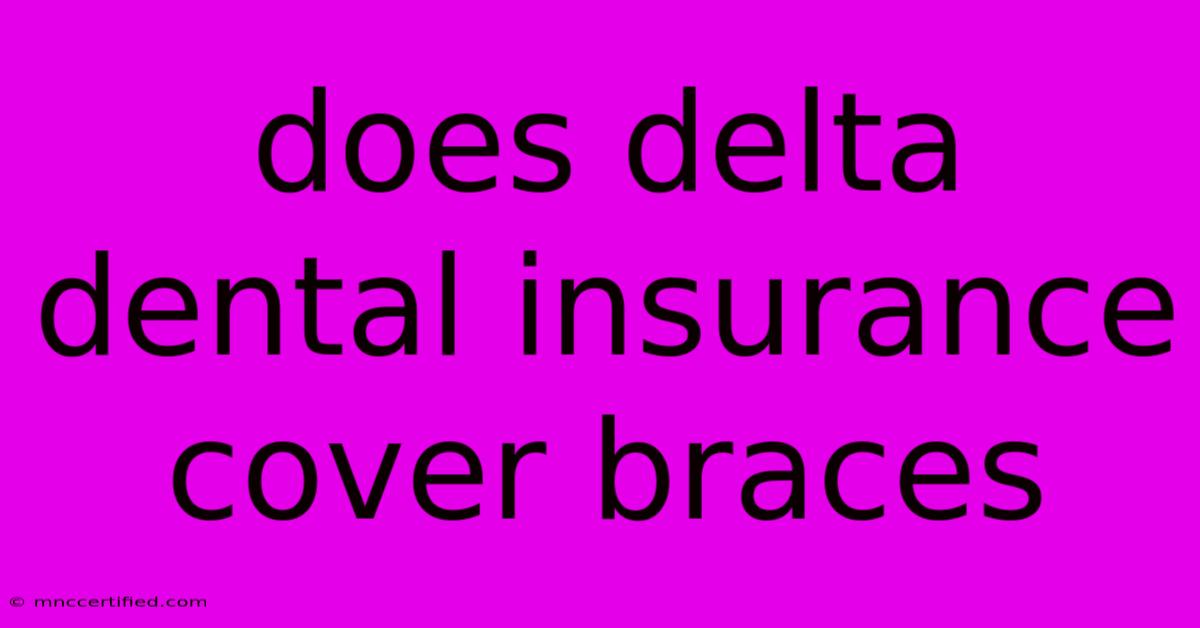Does Delta Dental Insurance Cover Braces

Table of Contents
Does Delta Dental Cover Braces? A Comprehensive Guide
If you're considering getting braces, one of the first questions that likely pops into your mind is: "Does my Delta Dental insurance cover braces?" The answer isn't always straightforward, as coverage varies depending on your specific plan and policy details.
This article will guide you through the intricacies of Delta Dental coverage for braces, helping you understand what to expect and how to navigate this process successfully.
Delta Dental's General Coverage
While Delta Dental is known for covering routine dental care like cleanings and fillings, braces are typically considered an elective or cosmetic procedure. This means they're often not fully covered by standard plans.
However, there are exceptions:
- Orthodontic Coverage: Some Delta Dental plans may include limited orthodontic coverage, often for children and adolescents. This coverage might apply to a specific percentage of the total cost or a maximum dollar amount.
- Medical Necessity: If your orthodontist can demonstrate that braces are medically necessary to address a health condition, such as TMJ disorder or a severe bite problem, Delta Dental might provide partial or full coverage.
Understanding Your Coverage
To determine if your Delta Dental plan covers braces, you need to:
- Review your policy document: Carefully examine your plan's details for information about orthodontic benefits, coverage limitations, and any specific requirements.
- Contact Delta Dental: Reach out to their customer service team for clarification. They can provide specific details about your plan's coverage for braces.
- Consult your orthodontist: Discuss your coverage with your orthodontist. They can guide you on the best course of action and help you understand the financial aspects involved.
Key Considerations for Braces Coverage
Here are some crucial factors to consider when seeking braces coverage:
- Age: Coverage for braces often differs based on age. Children and adolescents may be eligible for higher coverage than adults.
- Medical necessity: If your orthodontist can prove that braces are medically necessary, you have a higher chance of receiving coverage.
- Plan details: Your specific plan's details, including deductibles, copayments, and annual maximums, will influence the cost you bear.
Alternative Options for Braces Financing
If your Delta Dental plan doesn't fully cover braces, don't despair. Here are some alternative financing options:
- Payment plans: Many orthodontists offer payment plans, allowing you to spread the cost over several months.
- Dental financing companies: Companies like CareCredit and LendingClub offer financing options specifically for dental procedures.
- Health Savings Accounts (HSAs): If you have an HSA, you can use funds to pay for orthodontic expenses.
- Flexible Spending Accounts (FSAs): You can use pre-tax dollars from your FSA to cover eligible orthodontic expenses.
Final Thoughts
Understanding Delta Dental's coverage for braces is crucial for budgeting and making informed decisions. Remember, coverage varies widely, so contacting Delta Dental and reviewing your policy documents are vital steps. By being proactive and exploring alternative financing options, you can overcome the financial hurdles and achieve your desired smile.

Thank you for visiting our website wich cover about Does Delta Dental Insurance Cover Braces. We hope the information provided has been useful to you. Feel free to contact us if you have any questions or need further assistance. See you next time and dont miss to bookmark.
Featured Posts
-
Chelsea Line Up Confirmed Noah Match
Nov 08, 2024
-
Does Windshield Claim Increase Insurance
Nov 08, 2024
-
German Chancellor Under Fire For No Confidence Vote
Nov 08, 2024
-
Does Liability Insurance Cover Car Theft
Nov 08, 2024
-
Pogue Castmates React To Event News
Nov 08, 2024